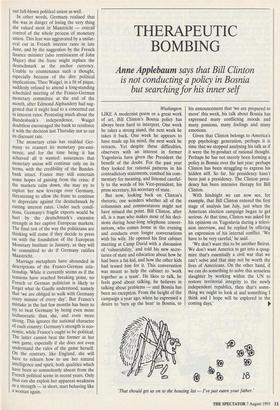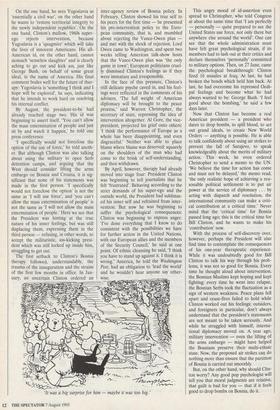THERAPEUTIC BOMBING
Anne Applebaum says that Bill Clinton
is not conducting a policy in Bosnia but searching for his inner self
Washington LIKE A modernist poem or a great work of art, Bill Clinton's Bosnia policy has always been hard to interpret. One week he takes a strong stand, the next week he takes it back. One week he appears to have made up his mind, the next week he retracts. Yet despite these difficulties, observers with an interest in former Yugoslavia have given the President the benefit of the doubt. For the past year they looked for rational patterns in his contradictory statements, combed his com- mentary for meaning, and listened careful- ly to the words of his Vice-president, his press secretary, his secretary of state.
But now, looking back on Clinton's rhetoric, one wonders whether all of the columnists and commentators might not have missed the point. Bill Clinton, after all, is a man who makes most of his deci- sions during hour-long telephone conver- sations, who comes home in the evening and conducts even longer conversations with his wife. He opened his first cabinet meeting at Camp David with a discussion of 'vulnerability,' and told his new secre- taries of state and education about how he had been a fat kid, and how the other kids had teased him for it. This conversation was meant to help the cabinet to 'work together as a team'. He likes to talk, he feels good about talking, he believes in talking about problems — and Bosnia has been no exception. From the height of the campaign a year ago, when he expressed a desire to 'turn up the heat' in Bosnia, to his announcement that 'we are prepared to move' this week, his talk about Bosnia has expressed many conflicting moods and many passions, many feelings and many emotions.
Given that Clinton belongs to America's pop psychology generation, perhaps it is time that we stopped analysing his talk as if it were the by-product of rational thought. Perhaps he has not merely been forming a policy in Bosnia over the last year: perhaps Clinton has been struggling to express his hidden self. So far, his presidency hasn't been just a presidency. The Clinton presi- dency has been intensive therapy for Bill Clinton.
With hindsight we can now see, for example, that Bill Clinton entered the first stage of analysis last July, just when the American election campaign began to get serious. At that time, Clinton was asked for his opinions on Yugoslavia during a televi- sion interview, and he replied by offering an expression of his internal conflict. 'We have to be very careful,' he said.
`We don't want this to be another Beirut. We don't want America to get into a quag- mire that's essentially a civil war that we can't solve and that may not be worth the lives of Americans. On the other hand, if we can do something to solve this senseless slaughter by working within the UN to restore territorial integrity to the newly independent republics, then that's some- thing we ought to look at and something I think and I hope will be explored in the coming days.'
'That should get us on to the housing list — I've just eaten your father.' On the one hand, he sees Yugoslavia as `essentially a civil war', on the other hand he wants to 'restore territorial integrity to the newly independent republics'. On the one hand, Clinton's mellow, 1960s super- ego rejects intervention, because Yugoslavia is a 'quagmire' which will take the lives of innocent Americans. His all- American id, on the other hand, cannot stomach 'senseless slaughter' and is clearly aching to go out and kick ass, just like George Bush, on behalf of some great ideal, in the name of America. His final comment bodes well for the future of ther- apy: Yugoslavia is 'something I think and I hope will be explored', he says, indicating that he intends to work hard on resolving his internal conflict.
By August, the president-to-be had already reached stage two. His id was beginning to assert itself. 'You can't allow the mass extermination of people and just sit by and watch it happen,' he told one press conference.
`I specifically would not foreclose the option of the use of force,' he told anoth- er. But although Clinton was also talking about using the military to open Serb detention camps, and arguing that the West should consider lifting the arms embargo on Bosnia and Croatia, it is sig- nificant that none of his statements was made in the first person. 'I specifically would not foreclose the option' is not the same as 'I will use force', and 'you can't allow the mass extermination of people' is not the same as 'I will not allow the mass extermination of people.' Here we see that the President was hinting at the true nature of his inner feelings, but was still displacing them, expressing them in the third person — refusing, in other words, to accept the militaristic, ass-kicking presi- dent which was still locked up inside him, struggling to get out.
The first setback to Clinton's Bosnia therapy followed, understandably, the trauma of the inauguration and the strains of the first few months in office. In Jan- uary, an uncertain Clinton ordered an inter-agency review of Bosnia policy. In February, Clinton showed his true self to his peers for the first time — he presented his pro-intervention policy to the Euro- pean community, that is, and mumbled about rejecting the Vance-Owen plan and met with the shock of rejection. Lord Owen came to Washington, and spent two weeks telling American talk-show hosts that the Vance-Owen plan was 'the only game in town'; European politicians cruel- ly dismissed Clinton's feelings as if they were immature and irresponsible.
In the face of this pressure, Clinton's still delicate psyche caved in, and his feel- ings were reflected in the comments of his advisers. 'The full weight of American diplomacy will be brought to the peace process,' said Warren Christopher, the secretary of state, repressing the idea of intervention altogether. Al Gore, the vice- president, projected his grief onto others: `I think the performance of Europe as a whole has been disappointing, and even disgraceful.' Neither was able to place blame where blame was deserved: squarely on the shoulders of the man who had come to the brink of self-understanding, and then withdrawn.
By April, however, therapy had already moved into stage four: President Clinton was beginning to tell journalists that he 'felt 'frustrated'. Behaving according to the strict demands of his super-ego and the outside world, the President had sublimat- ed his inner self and refrained from inter- vention. But now he was beginning to suffer the psychological consequences: Clinton was beginning to express anger. `I've done everything that I know to do consistent with the possibilities we have for further action in the United Nations, with our European allies and the members of the Security Council,' he said at one point. Of ethnic cleansing he said, 'I think you have to stand up against it. I think it is wrong.' America, he told the Washington Post, had an obligation to 'lead the world' and he wouldn't hear anyone say other- wise.
'It was a big surprise for him — maybe it was too big.' This angry mood of id-assertion even spread to Christopher, who told Congress at about the same time that 'I am perfectly — personally — quite prepared to see the United States use force, not only there but anywhere else around the world'. One can see that the whole administration must have felt great psychological strain, if its members had to lash out at their critics and declare themselves 'personally' committed to military options. Then, on 27 June, came the psychological breakthrough: Clinton fired 16 missiles at Iraq. At last, he had broken the bonds which held him back. At last, he had overcome his repressed Oedi- pal feelings and become what he had always wanted to be: George Bush. 'I feel good about the bombing,' he said a few days later.
Now that Clinton has become a real American president — a president who dares to drop bombs, to spill blood, to act out grand ideals, to create New World Orders — anything is possible. He is able to talk confidently about using air strikes to prevent the fall of Sarajevo, to speak knowledgeably about the merits of military action. This week, he even ordered Christopher to send a memo to the UN. `We believe the time for action has come and must not be delayed,' the memo read, `the only realistic hope of achieving a rea- sonable political settlement is to put air power at the service of diplomacy . . . by acting with dispatch and resolution, the international community can make a criti- cal contribution at a critical time.' Never mind that the 'critical time' for Bosnia passed long ago; this is the critical time for Bill Clinton, and he wants to make his `contribution' now.
With the process of self-discovery over, however, perhaps the President will also find time to contemplate the consequences of his one-year therapeutic experience. While it was undoubtedly good for Bill Clinton to talk his way through his prob- lems, it was not so good for Bosnia. Every time he thought aloud about intervention, the Bosnian Muslims kept hoping and kept fighting; every time he went into relapse, the Bosnian Serbs took the fluctuation as a sign of western weakness. Peace plans fell apart and cease-fires failed to hold while Clinton worked out his feelings; outsiders, and foreigners in particular, don't always understand that the president's statements are not meant to be taken seriously. And while he struggled with himself, interna- tional diplomacy moved on. A year ago, military intervention — even the lifting of the arms embargo — might have helped the Bosnians preserve their multi-ethnic state. Now, the proposed air strikes can do nothing more than ensure that the partition of Bosnia is carried out smoothly.
But, on the other hand, why should Clin- ton worry? Any good pop psychologist will tell you that moral judgments are relative, that guilt is bad for you — that if it feels good to drop bombs on Bosnia, do it.



















































 Previous page
Previous page